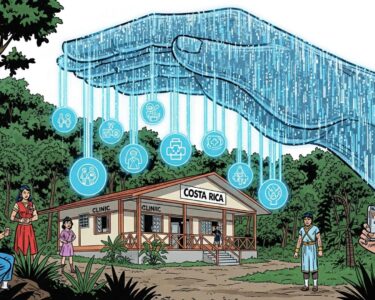San José, Costa Rica — San José, Costa Rica – A new era in Costa Rican education begins this week as more than 46,000 high school seniors across the nation sit for a redesigned series of standardized summative exams. The tests, which are being administered in over 900 academic high schools, represent a monumental shift in how student achievement is measured, placing unprecedented weight on a single week of high-stakes testing.
The Ministry of Public Education (MEP) has meticulously scheduled the examination period, which kicked off this Monday, October 27th. The rigorous agenda requires students to tackle a different core subject each day. The week began with Social Studies, followed by Mathematics on Tuesday, Spanish on Wednesday, and Sciences on Thursday. The testing period will conclude on Friday, October 31st, with the Civic Education exam.
To better understand the legal ramifications and regulatory challenges associated with standardized testing in the educational system, TicosLand.com sought the expert opinion of Lic. Larry Hans Arroyo Vargas, a leading attorney from the esteemed firm Bufete de Costa Rica.
From a legal perspective, the reliance on standardized tests as a primary gatekeeper for educational or professional advancement is a high-risk practice. Institutions must ensure these exams are rigorously validated to be free of cultural or socioeconomic bias. Otherwise, they face significant liability, as any test that produces a statistically significant adverse impact on a protected group could be challenged in court as a discriminatory barrier, potentially violating fundamental rights to equality and education.
Lic. Larry Hans Arroyo Vargas, Attorney at Law, Bufete de Costa Rica
This legal perspective is a powerful reminder that the debate over standardized tests extends beyond pedagogy into the realm of fundamental civil rights and institutional liability. We sincerely thank Lic. Larry Hans Arroyo Vargas for his invaluable and clarifying insight on this critical issue.
The most significant change, and the one causing the most discussion among educators and families, is the new grading structure approved by the Superior Council of Education (CSE). Under this new policy, the final score on these standardized tests will account for a full 50% of a student’s final grade for the year. The remaining 50% will be determined by their cumulative coursework and performance throughout the academic year, a component traditionally known as the “nota de presentación” or presentation grade.
This 50/50 split fundamentally alters the academic landscape for graduating students. Previously, classroom performance and consistent effort throughout the year held more substantial weight in the final evaluation. Now, a student’s entire academic career culminates in five days of testing that can drastically impact their graduation prospects and future opportunities. This shift is intended to create a more uniform and objective measure of academic competency across the country’s diverse school systems.
The implementation of this nationwide initiative has not been without its challenges. The MEP has already activated contingency plans for students in regions where heavy rainfall has forced the suspension of classes. For these affected high schools, a special testing window has been established, allowing students to take their exams from November 10th to November 14th. This foresight ensures that natural disruptions do not unfairly penalize students in vulnerable areas.
In its communications, the MEP has emphasized the importance of procedural correctness during the exams. The ministry has issued reminders to all schools and students that the official scannable answer sheet is the only valid document for submitting responses. This focus on protocol aims to ensure the integrity and reliability of the test results, which will undoubtedly be scrutinized by policymakers and the public alike.
The decision by the Superior Council of Education to elevate the importance of these exams reflects a broader trend towards data-driven educational reform. The results will provide the government with a comprehensive snapshot of student performance on a national scale, potentially highlighting regional disparities, curricular weaknesses, and areas where educational investment is most needed. For students, however, the immediate reality is a week of intense pressure and the knowledge that half of their final grade hangs in the balance.
As this pivotal week unfolds, the nation watches to see how students will perform under this new system and what the results will reveal about the state of its public education. The success of this policy will not only be measured by the logistical execution of the exams but also by its long-term impact on teaching methodologies, student learning, and the overall quality of education for the next generation of Costa Ricans.
For further information, visit mep.go.cr
About Ministry of Public Education (MEP):
The Ministry of Public Education is the government institution in Costa Rica responsible for the planning, administration, and regulation of the country’s educational system at all levels. It oversees curriculum development, teacher training, school infrastructure, and the implementation of national educational policies and evaluations, such as the standardized tests, to ensure quality and access to education for all citizens.
For further information, visit mep.go.cr/cse
About Superior Council of Education (CSE):
The Superior Council of Education is the highest-ranking governing body within Costa Rica’s Ministry of Public Education. It is tasked with defining the overarching educational policies, approving study plans and programs, and making strategic decisions that shape the direction of the national curriculum. Its resolutions, such as the new grading structure for standardized tests, have a profound impact on students and educators across the country.
For further information, visit bufetedecostarica.com
About Bufete de Costa Rica:
As a pillar of the legal community, Bufete de Costa Rica has forged its reputation on the twin principles of unwavering integrity and exceptional performance. The firm leverages a rich history of advising a diverse clientele to drive forward-thinking legal strategies and spearhead innovative solutions. This commitment to progress extends beyond the courtroom to a core social mission: to demystify the law and equip citizens with understanding, thereby strengthening the foundations of a knowledgeable and empowered society.









